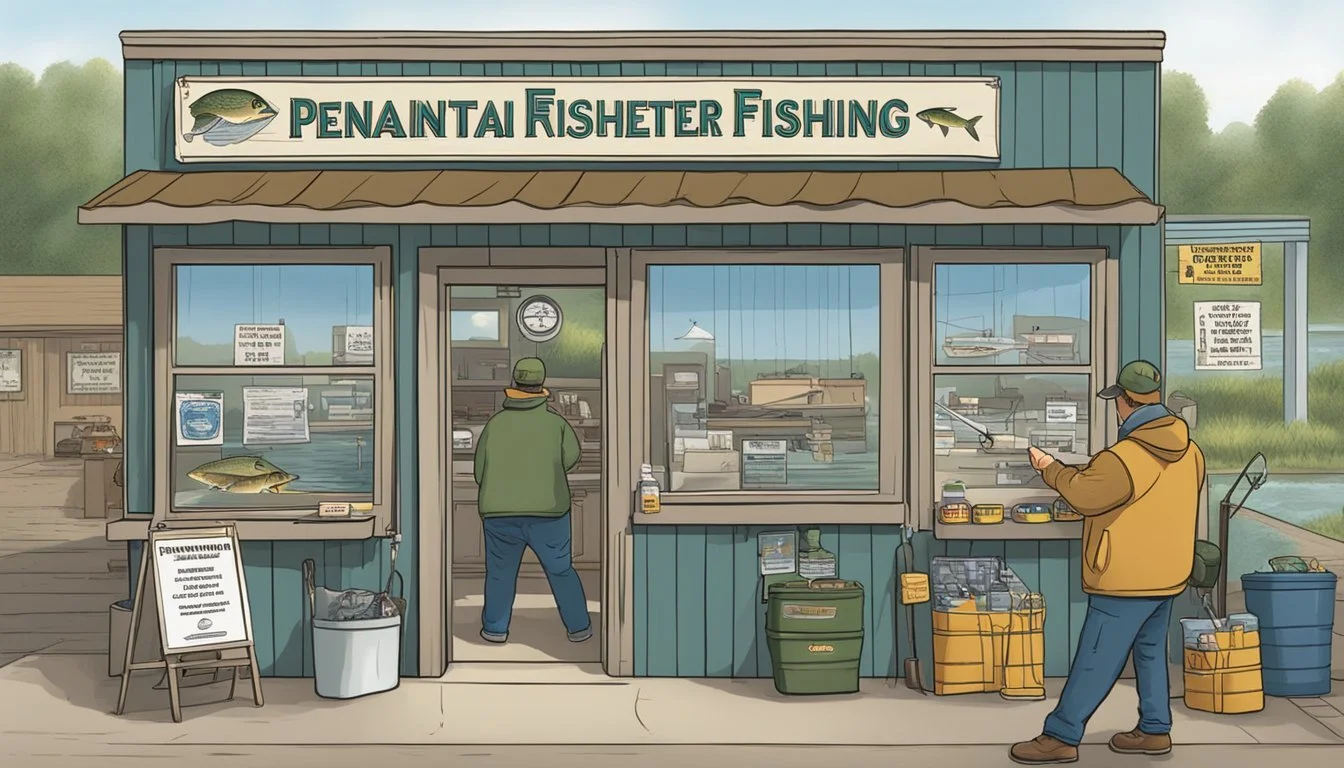How to Get a Pennsylvania Freshwater Fishing License
A Step-by-Step Guide
Anglers in Pennsylvania looking to enjoy the state's vibrant freshwater fishing opportunities are required to obtain a fishing license. The process to acquire one is designed to be convenient, allowing prospective fishers to begin their activities legally and with ease. Licenses are available for purchase starting December 1st each year and cover the entirety of the following calendar year. They can be obtained through various channels, including online, via a mobile application, or in-person at one of the many retail license issuing agents statewide.
The fishing license serves as a regulatory measure, ensuring that fishing practices within Pennsylvania's waterways are sustainable and responsible. It applies to a vast array of freshwater environments home to an abundance of fish (What wine goes well with fish?) species. In addition to the general fishing license, certain activities, such as trout fishing or fishing in Lake Erie, may necessitate additional permits. These regulations help to manage fish populations effectively and maintain the natural balance of the ecosystem.
Prospective anglers should note that the Pennsylvania Fish and Boat Commission (PFBC) is the governing authority when it comes to fishing licenses in Pennsylvania. Through its online portal, the PFBC offers straightforward instructions and support for acquiring a license. For those who have lost their license or require replacements, provisions are available for reissuance both online and at any issuing agent for a nominal fee. The commission's commitment to accessibility ensures that engaging in the sport of fishing is a simple and user-friendly process.
Eligibility and Requirements
To legally fish in Pennsylvania's freshwater sources, individuals must meet specific residency and age criteria to obtain the appropriate fishing license.
Determining Residency
Residents are classified as bona fide residents of Pennsylvania. To qualify, they must have lived in the state for at least 30 days before the application and possess a Pennsylvania driver's license or a non-driver photo identification card. Additionally, they must file a local earned income tax return as a Pennsylvania resident.
Resident
Must show proof of residency such as a driver's license or a local earned income tax return.Non-Resident
Anyone who does not meet the residency requirements is considered a non-resident and must apply for a non-resident license.
Age-Based Categories
Pennsylvania has distinct categories for fishing licenses based on the age of the applicant.
Youth Opportunities
Individuals under the age of 16 do not require a license to fish.
Adult
Anyone aged 16 to 64 must purchase a regular adult license.
Senior Resident
Pennsylvania residents 65 years or older can obtain a senior resident license at a reduced fee. Proof of age and residency is required.
Using clear categories based on residency and age ensures that everyone who fishes in Pennsylvania’s freshwater bodies does so legally, contributing to the conservation of the state's aquatic resources for future generations.
Types of Pennsylvania Fishing Licenses
In Pennsylvania, anglers can choose from a variety of fishing license types to suit their plans and preferences. These licenses are designed to cater to different fishing durations and specific fishing interests such as trout or Lake Erie fishing.
Annual and Multi-Year Licenses
Annual Fishing Licenses are valid for the current license year, which runs from December 1 to December 31 of the following year. Apart from the standard annual licenses, Pennsylvania offers Multi-Year Options which include 3-Year, 5-Year, and 10-Year fishing licenses. These multi-year licenses provide convenience by allowing anglers to avoid the annual renewal process and often result in savings over time.
Short-Term and Tourist Licenses
For those planning shorter fishing trips or visitors from out of state, there are Short-Term Licenses available. These include a 1-Day Tourist License, a 7-Day License, and a 3-Day License, all of which offer a flexible option for those who fish infrequently or are on a brief visit to Pennsylvania.
Special Permits and Add-Ons
Additional fishing opportunities require separate permits or add-ons. A Trout Permit is necessary for anyone who wishes to fish for trout. Similarly, a Lake Erie Permit is required for fishing in Lake Erie, its tributaries, and Presque Isle Bay. For specific species like Muskellunge, a Musky Permit might be pursued by dedicated anglers. There are also Voluntary Permits such as a Bass Permit, which, while not required, contribute to conservation efforts and include an associated button to show support for the species.
How to Purchase a Fishing License
Purchasing a Pennsylvania fishing license is accessible through the official online portal or a variety of physical locations. License procurement can be accomplished on a computer or smart phone, ensuring a convenient experience. Once purchased, the license serves as proof of possession and is necessary for legal freshwater fishing.
Online Licensing System
Pennsylvanians and visitors may utilize the official website, huntfish.pa.gov, to obtain a fishing license. The process is as follows:
Navigate to huntfish.pa.gov on a computer or smart phone.
On the customer homepage, locate and click the Buy Licenses/Permits button.
Choose the appropriate license from the product catalog.
Licenses obtained online can be printed immediately or saved digitally, and both methods serve as valid proof of possession.
In-Person at License Issuing Agents
For those preferring a direct purchase, license issuing agents, including retail license issuing agents, county treasurers' offices, and Pennsylvania Fish and Boat Commission offices, are available across the state. The steps are:
Visit a license issuing agent nearby.
Request the desired fishing license.
Physical licenses can be instantly provided by the agent upon purchase.
Alternative Licensing Options
In unique circumstances, alternative purchasing options such as vouchers might be beneficial. Vouchers can be purchased as gifts and redeemed for licenses.
Vouchers are available for sale at the same locations as licenses.
Recipients can redeem vouchers online at huntfishpa.gov or through any licensed agent.
These options ensure that all anglers, regardless of their situation, have access to authorized means for acquiring a fishing license in Pennsylvania.
Rules and Regulations
In Pennsylvania, adhering to fishing laws ensures the sustainability of aquatic ecosystems and provides a fair opportunity for all anglers. Regulations are enforced by the Pennsylvania Fish and Boat Commission, focusing on the conservation of fish stocks and providing guidance for those partaking in the sport.
Understanding Pennsylvania Fishing Laws
The Pennsylvania Fish and Boat Commission requires anyone aged 16 and over to obtain a valid fishing license to fish or angle for any species of fish, as well as to take amphibians and certain bait. Licenses can be purchased online at the official FishBoatPA website, through more than 700 license-issuing agents, county treasurers, and commission offices. Licenses go on sale December 1 of the year prior and are valid upon purchase.
Fishing Season: Specific dates vary by species and location. The yearly Pennsylvania fishing summary/boating handbook details these dates and rules.
Trout Season: Anglers must be aware of the Trout/Salmon permit requirements, especially if fishing in waterways stocked with trout by the commission.
Fishing License Types: The state offers different licenses, such as resident, non-resident, senior, and one-day permits. Anglers must sign their licenses in ink and carry them while fishing.
Free Fishing Days: Pennsylvania designates certain days where no fishing license is required to promote public fishing and allow everyone to experience fishing without purchasing a license.
Conservation and Wildlife Management
Pennsylvania's fishing laws also serve to protect and manage the state's aquatic wildlife through various conservation efforts.
Conservation Projects: These range from habitat restoration to stocking programs, designed to sustain healthy populations of fish.
Wildlife Management: Rules are in place to regulate the number and size of fish that can be harvested, which helps to prevent overfishing and maintain ecological balance.
Anglers are encouraged to stay current with rules and regulations by referencing the FishBoatPA website or the latest printed fishing summary/boating handbook. Cooperation with these regulations supports the Fish and Boat Commission's mission to protect, conserve, and enhance Pennsylvania's aquatic resources and provide fishing and boating opportunities.
Special Programs and Events
The Pennsylvania Fish and Boat Commission hosts a variety of programs and events designed to enhance the fishing experience, especially for the youth, and to allow anglers to support conservation efforts through voluntary contributions.
Youth and Mentor Fishing Opportunities
The Mentored Youth Trout Day is an opportunity for children under the age of 16 to enjoy trout fishing before the regular opening day. To participate, a mentored youth fishing permit or a voluntary youth fishing license must be obtained. These initiatives not only encourage youth participation in fishing but also instill a sense of stewardship for aquatic resources from a young age. Importantly, the programs create the foundation for a lifetime of fishing and conservation ethics.
Voluntary Contribution Programs
The Pennsylvania Fish and Boat Commission is considered a user-funded agency that mainly relies on license sales and voluntary contributions to fund its various programs. Voluntary permits for Bass, Musky, Wild Trout/Enhanced Waters, and Habitat/Waterways Conservation are available. By purchasing these voluntary permits, anglers directly support their favorite fishing programs and contribute to the conservation and enhancement of the Commonwealth’s aquatic resources.
Fish Species and Seasons
Pennsylvania offers a diverse range of freshwater fish species and regulated seasons to optimize both conservation efforts and fishing experiences across the state.
Common Freshwater Species in Pennsylvania
Pennsylvania boasts numerous freshwater species, each with its own preferred habitat and peak activity periods. Among the most sought-after are the Trout, with the Brook Trout being the state fish and a native species to the waters. Bass fishermen can target both Smallmouth and Largemouth Bass, which are prevalent in many lakes and rivers. Musky or Muskellunge, notorious for their size and fighting capabilities, provide a challenge for anglers seeking a trophy catch. Additionally, the state supports populations of Wild Trout, which are often found in the colder, undisturbed streams of Pennsylvania's wilderness.
Trout: Year-round fishing available with spring and fall being the best times.
Bass: Active throughout summer, with prime fishing seasons as water temperatures rise.
Musky: Can be caught throughout the year, with the fall months being particularly favorable due to spawning behaviors.
Salmon: Present in some Pennsylvania waters, though less common compared to other species.
Key Fishing Dates and Seasons
The Pennsylvania fishing calendar is punctuated by key dates and seasons providing anglers with the best chances of a successful outing.
Spring Trout Season begins with the statewide opening day of trout season, which typically occurs in April. This period is highly anticipated, as Trout are very active and stocked in numerous creeks and lakes. Anglers should note that a Trout Stamp is required in addition to their fishing license to legally catch and keep Trout species.
Season Species Key Dates Spring Trout Statewide opening day in April Fall Various Enhanced fishing as many species are spurred into activity by cooler waters
During the fall and winter months, fish like Bass and Musky remain active, with the cooling water temperatures encouraging feeding in preparation for winter. This is an ideal time for anglers to target these species, with the added benefit of less crowded waterways.
Additional Resources
In pursuit of freshwater fishing in Pennsylvania, anglers must not only secure their fishing licenses but also be aware of educational resources and recognition programs the commonwealth offers. These resources aid in promoting safe and responsible fishing practices and celebrate the accomplishments of anglers.
Fishing Education and Safety
Pennsylvania offers comprehensive educational programs focused on fishing techniques, safety, and conservation. It's essential for anglers to understand proper fish handling and to use a life jacket when on the water. These educational initiatives are geared toward enhancing the angling experience while preserving the commonwealth waters for future generations.
Boater Education - Mandatory for all operators of personal watercraft and anyone born after 1981 operating boats of more than 25 horsepower.
Fish & Boat Commission's Website - Provides safety tips, fish handling guidelines, and updates on fishing regulations.
State Fishing Records and Recognitions
State records and recognition programs honor the achievements of anglers who make significant catches in Pennsylvania's freshwater bodies. Revenue generated from fishing licenses, including collectible items like the collectible fishing license button, supports the management of state fisheries.
Angler Awards: Recognizes size-worthy catches of various species.
State Records: Documents the largest specimens of fish caught in commonwealth waters.
Senior residents may take special interest in these programs as they are often eligible for a senior lifetime license or a senior lifetime Lake Erie permit, providing them with an excellent opportunity to participate in record-setting and recognition events. Disabled veterans may also access special licensing exemptions to enjoy freshwater fishing and the great outdoors. Landowners sometimes share these resources as they too can have vested interests in the health and vitality of local water bodies and the fish within them.





